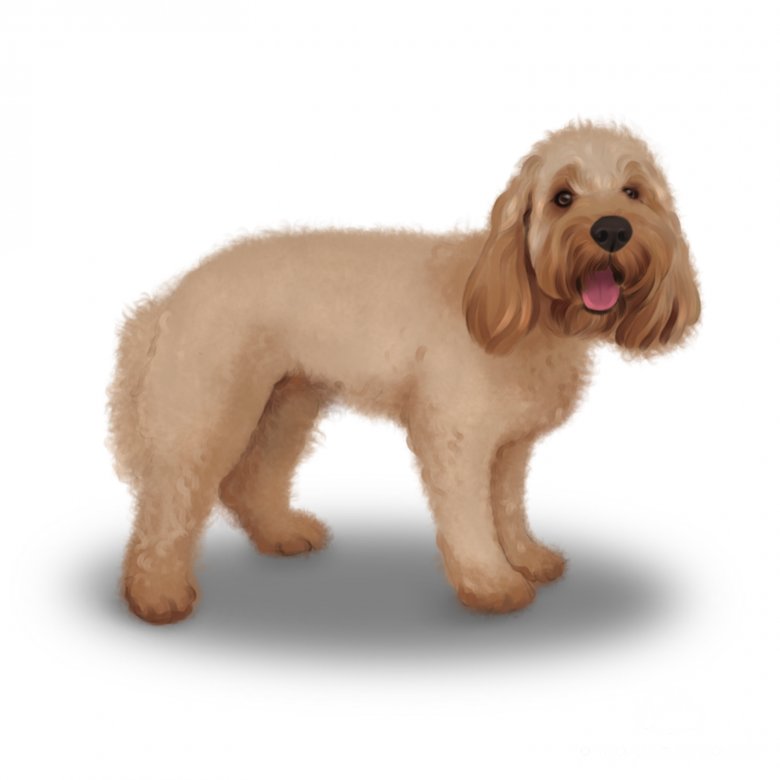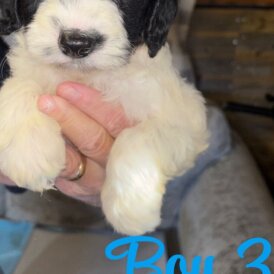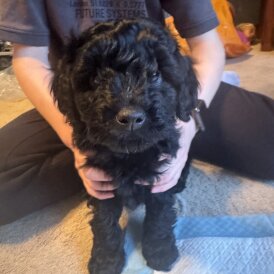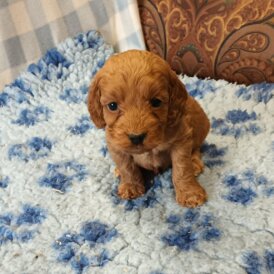Why Cockapoos are great
Sweet, sociable and easy to train, Cockapoos make excellent companions. At home on an agility course or in your lap, their affectionate and forgiving temperament means you’ll never feel lonely. Some highlights:
Their soft coats hardly shed, and are good for allergy sufferers.
They are very people-oriented, so all your friends will fall in love with them!
Not only are they great with people, but they are also dog-friendly.
Their compact size means they’re great to cuddle, but they’re also big enough to run around with larger breeds.
Things to consider when looking at Cockapoos for Sale
Though there are very few downsides to this lovely breed, there are some important aspects to consider before deciding whether they are right for you. Some downsides to the Cockapoo:
As with all mixed breeds, there is a slight risk that the cross may produce an unhappy temperament — make sure you research the breeder.
Their coat is reasonably high maintenance and requires regular grooming.
Because of their status as a crossbreed, they are not recognised by the Kennel Club.
Their attached nature means that Cockapoos do not enjoy being left alone for long periods of time.
History of Cockapoos
A cross between a Cocker Spaniel and a poodle, the Cockapoo was one of the first of the so-called ‘designer’ breeds, originating in the United States in the 1950s. They were bred with the intention of combining the good-natured, predictable temperament of a Cocker Spaniel with the intelligence and spirit of a poodle. Breeders prioritised health and temperament over aesthetic appearance, resulting in a healthy, hypoallergenic breed which is sturdy and energetic (and also very cute!).
Appearance
Though Cockapoos vary in appearance, they all share adorable, friendly faces, round, inquisitive eyes and extremely soft coats.
How big is the Cockapoo?
A typical male or female Cockapoo (not of the teacup or toy variety) will measure between 25 and 38cm at the withers.
How heavy is the Cockapoo?
Cockapoos can range in weight from 5.4kg to as heavy as 10.9kg, depending on the size of the parents.
What Colour is the Cockapoo?
Cockapoos come in many different colours. Some types include:
Temperament
As mentioned earlier, the Cockapoos have an excellent temperament — they are warmhearted, charming and lively dogs. Friends, family and even passing strangers will be won over by their sweet nature and people-oriented attitude. You will want to keep an eye out to make sure that others don’t try to take your dog home with them!
Do Cockapoos make good guard dogs?
Because of their compact size and people-oriented nature, Cockapoos do not make natural guard dogs, but they may bark if someone approaches the house.
Do Cockapoos bark a lot?
They are not known for their barking, but they may become agitated and bark if left alone for a long period of time. As with any other breed, they can be trained not to bark excessively.
Are Cockapoos easy to train?
Their even temperament and intelligence make Cockapoos very easy to train. Because of this, they make good agility dogs. They are, however, very sensitive to punishment, so only positive reinforcement should be used in their training.
Are Cockapoos playful?
Cockapoos have a sparky personality, and are incredibly playful and animated dogs. This means they need regular attention and mental stimulation, or they may become bored.
Are Cockapoos good with children?
Cockapoos are extremely sociable, so can be relied upon to be warm and friendly to people of all ages. Their fun-loving and affectionate nature is likely to be adored by children.
Are Cockapoos good with other pets?
At ease with both animals and people, Cockapoos will live happily with other pets (provided they still get enough attention!).
Can I leave a Cockapoo Alone?
Here one of the breed’s highlights is also one of its drawbacks — because of their loyalty and attachment, Cockapoos may suffer from separation anxiety, and should not be left alone for long periods of a time. They may also struggle with being away from their owner(s), even if they are in the company of someone else.
Health
How long do Cockapoos live?
As with many smaller breeds, the Cockapoo has a long lifespan, and can be expected to live between 12 and 15 years. Some may even live as long as 18 years.
How much exercise does a Cockapoo need?
Cockapoos have a reasonable energy level, so require at least 15 minutes to an hour of exercise a day. Their liveliness means that they need diversion and variety in their exercise, so expect to play lots of games of fetch as well as taking them on walks and runs.
What are Cockapoos Common health issues?
As long as you buy responsibly from the right breeder, Cockapoos on the whole are healthy dogs. They are susceptible to eye infections and ear infections if their eyes and ears are not cleaned regularly, and it is not uncommon for them to develop gastrointestinal disorders. Liver disease is increasingly common amongst Cocker Spaniels, so you should ask your breeder whether the parent has had any liver problems.
Care
How much space do I need for a Cockapoo?
With its playful nature and moderate energy level, a Cockapoo would benefit from at least a small garden for lots of playtime! When indoors, these companion dogs are happy to sit on your lap, or snuggle up next to you on a sofa. Smaller toy varieties of this breed are more suited to living in an apartment than their larger counterparts. Cockapoos are most at home indoors and should definitely not live outside.
How much grooming do Cockapoos need?
Although they do not require as much maintenance as a poodle, a Cockapoo’s fur grows quickly, and requires regular grooming to avoid it becoming matted and dirty. You can easily perform this grooming at home with a dog comb.
Do Cockapoos shed?
One of the highlights of this breed is that they hardly shed, and are therefore great for people with allergies (and for people who like a house free of dog hair!).
Average costs
How much does it cost to keep a Cockapoo?
As a rough guide in pricing: Cost to buy: roughly £1,000 for a well-bred Cockapoo puppy Food costs: £25 per month Vet costs: £150 per year
Specific Buying Guide
You can read our general buying guide here (/advice-on-buying-a-puppy/), with the most important thing being going to view your Cockapoo Puppy, seeing it with its mother, and checking the quality of the breeder. More specifically, here is some Cockapoo puppy buying advice:
Checking the quality of the breeder is especially important with crossbreeds, as if the quality of the breeding is lacking the dogs may be susceptible to an unhappy, fearful temperament or health issues.
For Cockapoos, make sure that the breeder has had an OFA exam to check both parents for luxating patellas (loose knees) and hip dysplasia, as these genetic conditions can be passed on to their puppies.
Other reading, Adoption and Rescue Organisations
A big thank you to the following sources who helped to shape this article: https://www.cockapooclubgb.co.uk/ https://www.cockapooowners-club.org.uk/ https://dogtime.com/dog-breeds/cockapoo https://thehappypuppysite.com/cockapoo/ https://www.cockapoohq.com/















